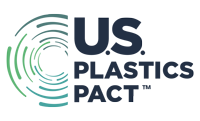Through their commitment to the U.S. Plastics Pact, Activators are working to increase their usage of Postconsumer Recycled Content (PCR) and in effect, decrease their usage of virgin plastic. Strong and consistent demand for PCR is a key component in a circular economy. The U.S. Pact’s PCR toolkit was created to assist companies in making that conversion and taking an important step toward circularity.

Procurement & Purchasing Resources
Topics include:
- Finding a PCR Supplier
- Purchasing Options
- Pricing Considerations
- Contract Considerations

R&D/Quality Assurance Resources
Topics include:
- Quality Considerations
- Food Grade Applications
- Working with Your Converter
- On-pack labeling

Brand, Sustainability & Gov't Affairs Resources
Topics include:
- Why Use PCR?
- Consumer Perceptions of PCR
- Legislation & Regulation
- Overcoming Financial Barriers
- Other Resources

Why and how to buy products with PCR
Topics include:
- What is PCR?
- Recycled vs. Recyclable
- Why Buy Products with PCR?
- How to identify products with PCR
What is PCR
POSTCONSUMER RECYCLED CONTENT (PCR): Proportion, by mass, of postconsumer recycled material in a product or packaging.
The International Standards Organization (ISO) has defined “postconsumer material” as material generated by households or by commercial, industrial and institutional facilities in their role as end users of the product which can no longer be used for its intended purpose. This includes returns of material from the distribution chain. (ISO 14021:2016).
In the realm of plastic packaging, Postconsumer Recycled Content is plastic that reached the end of its initial intended use and was subsequently collected and recycled back into a new product or packaging.
PCR Certification
The U.S. Plastics Pact encourages certification of PCR materials. This ensures that the materials are indeed postconsumer recycled materials and increases confidence in any claims made by the company. The U.S. Pact has developed a set of principles for effective PCR certification that includes requiring third-party certification, incorporating equity, and maintaining transparency, among other important aspects. A guidance document on understanding and completing the certification process, including evaluating certification standards, has also been developed to assist companies in starting certification efforts.
U.S. Pact's PCR Commitment Statement
The U.S. Pact has voluntary PCR usage requirements for all its Activators based on their place in the plastics value chain, with the goal of creating momentum to reach Target 4 of the U.S. Plastics Pact Roadmap of an average of 30% (by weight) postconsumer recycled content in plastic packaging sold within the United States by 2025. The U.S. Pact expects that Activators who already have a publicly stated general recycled content commitment specifically call out PCR commitments instead of or in addition to using the term “recycled content.” For U.S. Pact Activators who produce and distribute plastic packaging, such as consumer product goods companies (CPGs), retailers, and converters, we expect each to publicly state a commitment to a quantifiable target of PCR that is incorporated into their plastic packaging by 2025. For Activators that are non-plastic packaging producers, such as government entities, nonprofit organizations, and recyclers, we expect that each Activator publish external statements on quantifiable internal PCR procurement. PCR internal procurement includes, but is not limited to, office supplies, trash bags, pallets or bins/totes, and trash and recycling bins. The U.S. Pact also encourages non-packaging Activators to have a public statement supporting the use of PCR to address PCR markets on a larger scale, closing this loop of the circular economy.
PIR Statement
PIR is Out of Scope for U.S. Pact Measurement
Post-industrial recycled (PIR) materials divert waste from the landfill and reduce the need for virgin plastic. The U.S. Pact, as a standard operating procedure, recommends that Activators utilize PIR in their products and procurements. The ISO definition for PIR is, “pre-consumer…a material diverted from the waste stream during a manufacturing process. Excluded is reutilization of materials such as rework, regrind or scrap generated in a process and capable of being reclaimed with the same process that generated it.” However, the U.S. Pact does not allow PIR commitments or use to replace PCR commitments as part of the U.S. Pact’s four targets. The U.S. Pact recognizes that there is more work to be done to create markets for PCR than there is for PIR, and as such PCR commitments are the priority.
Examples of Postconsumer & Post-Industrial Materials
Below are examples of PCR and PIR. PIR is out of scope for the U.S. Pact. The differences between PIR and PCR are nuanced, and it is important to identify real-world applications of both.
Postconsumer materials based on the ISO definition:
- A consumer purchases a bottle of soda, drinks it, and places it in a recycling bin.
- A pallet of laundry detergent ships from the producer to the retailer. The retailer discovers that a bottle has leaked laundry detergent all over the rest of the bottles. The bottles are emptied and sent to a recycler.
- Stretch wrap is used to transport a pallet from the producer to a retailer. The retailer cuts off the stretch wrap and sends it to a recycler.
Post-industrial materials based on the ISO definition:
- A mask manufacturer purchases roll stock and trims it into individual masks. The trimmings are sent to a recycler.
- 4 truckloads of jars arrive at a manufacturing facility and are warped and unusable. They are sent to a recycling facility.
Disclaimer
The U.S. Plastic Pact created this toolkit to assist U.S. Pact Activators in voluntarily purchasing postconsumer resin for their products and packaging. This toolkit does not contain any endorsements, recommendations, legal or financial advice, and should not be construed as such. The U.S. Pact and contributing authors are not liable for any business decisions that result from consulting this toolkit.


